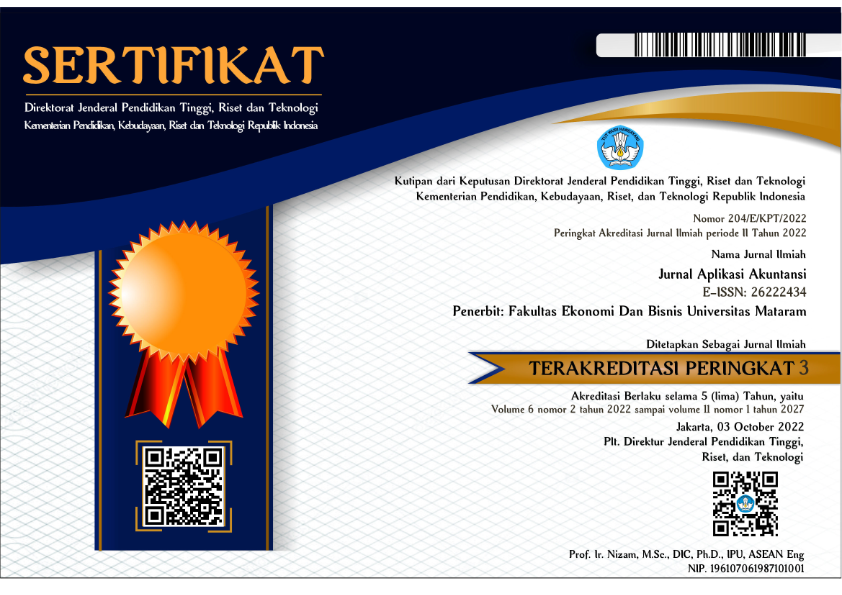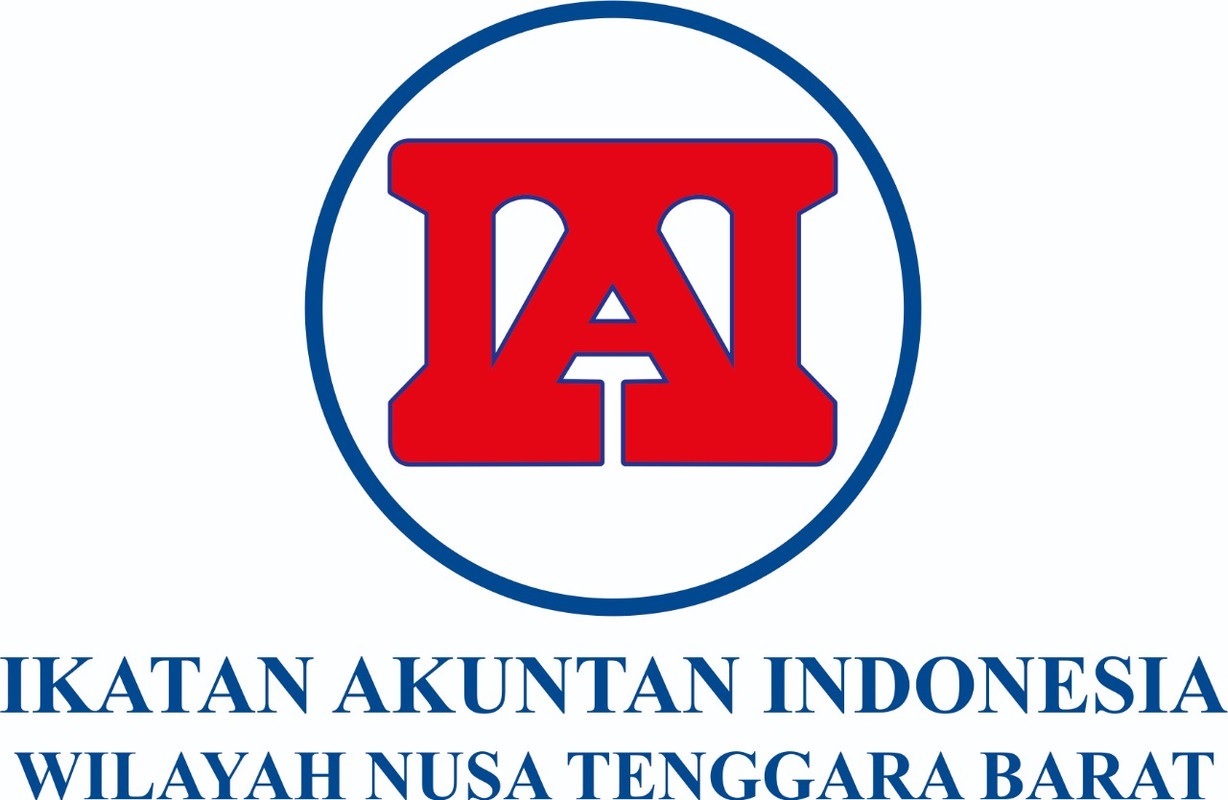CARBON EMISSION DISCLOSURE: VIEWED FROM THE PERSPECTIVES OF ACCOUNTING, MARKET, AND ENVIRONMENTAL PERFORMANCE IN HIGHLY POLLUTING COMPANIES IN INDONESIA
DOI:
https://doi.org/10.29303/jaa.v10i1.699Keywords:
carbon disclosure, environmental performance, financial indicators, market performance, high-polluting industriesAbstract
This study examines the determinants of carbon emission disclosure (CED) among high-polluting industries in Indonesia by integrating accounting performance (ROA), market performance (Tobin’s Q), and environmental performance (PROPER) into a multidimensional analytical model. The research utilises 114 firm-year observations from 30 listed companies on the Indonesia Stock Exchange (IDX) between 2021 and 2024, selected through purposive sampling. Multiple linear regression analysis was conducted using STATA. The regression model explains 35.6% (R² = 0.356) of the variation in carbon emission disclosure, indicating a moderate explanatory power of the independent variables. The results reveal that Tobin’s Q and PROPER positively affect carbon emission disclosure, indicating that market perception and environmental rating systems encourage greater transparency. Conversely, ROA shows no significant relationship with disclosure practices, suggesting that profitability alone does not influence firms’ environmental reporting behaviour. This study focuses on Indonesia, one of the world’s largest carbon emitters, where high-polluting industries such as mining, energy, and chemicals play a dominant role but often exhibit inconsistent or superficial disclosure practices. This study highlights that market expectations and environmental performance are more decisive than financial outcomes in shaping disclosure behaviour. These findings underscore that external pressures drive carbon disclosure rather than internal profitability. The study offers empirical insights for regulators, investors, and companies aiming to enhance sustainability and accountability in carbon-intensive sectors. However, this study is limited by its short observation period (2021–2024) and focus on selected high-polluting industries, which may restrict generalisability. Future research could extend the time horizon, examine other sectors, or include governance and ownership variables to provide a more comprehensive picture.
References
Abu Hussain, M., Alsayegh, M. F., & Boshnak, H. (2025). The Role of ESG Disclosure in Enhancing Profitability and Market Value: Insights from Saudi Arabia’s Corporate Landscape. Maha Faisal and Boshnak, Helmi, The Role of ESG Disclosure in Enhancing Profitability and Market Value: Insights from Saudi Arabia’s Corporate Landscape.
Akhiroh, T., & Kiswanto, K. (2016). The determinant of carbon emission disclosures. Accounting Analysis Journal, 5(4), 326–336.
Al-Mari, J. R., & Mardini, G. H. (2024). Financial performance and carbon emission disclosure. Journal of Business and Socio-Economic Development, 4(4), 293–307.
Carbon Brief. (2019). The carbon brief profile: Indonesia. Carbon Brief Clear on Climate Change. Available Online: Https://Www. Carbonbrief. Org/the-Carbon-Brief-Profile-Indonesia/(Accessed on 25 May 2025).
Choi, B. B., Lee, D., & Psaros, J. (2013). An analysis of Australian company carbon emission disclosures. Pacific Accounting Review, 25(1), 58–79.
Choi, J.-H., Hwang, S.-J., & Chiu, J. L. (2024). The moderating role of governance mechanisms on the relationship between ESG disclosure and firm value. Review of Integrative Business and Economics Research, 13(3), 59–72.
Clarkson, P. M., Li, Y., Richardson, G. D., & Vasvari, F. P. (2008). Revisiting the relation between environmental performance and environmental disclosure: An empirical analysis. Accounting, Organizations and Society, 33(4–5), 303–327. https://doi.org/10.1016/j.aos.2007.05.003
Cormier, D., Magnan, M., & Van Velthoven, B. (2005). Environmental disclosure quality in large German companies: economic incentives, public pressures or institutional conditions? European Accounting Review, 14(1), 3–39.
Dawkins, C., & Fraas, J. W. (2011). Coming clean: The impact of environmental performance and visibility on corporate climate change disclosure. Journal of Business Ethics, 100(2), 303–322.
Deegan, C. (2002). Introduction. Accounting, Auditing & Accountability Journal, 15(3), 282–311. https://doi.org/10.1108/09513570210435852
Dharma, F., Marimutu, M., & Alvia, L. (2024). Profitability and market value effect on carbon emission disclosures: the moderating role of environmental performance. International Journal of Energy Economics and Policy, 14(3), 463–472.
Ekasari, K., Eltivia, N., Indrawan, A. K., & Miharso, A. (2021). Corporate Commitment of Environment: Evidence from Sustainability Reports of Mining Companies in Indonesia. Indonesian Journal of Sustainability Accounting and Management, 5(1), 1–10. https://doi.org/10.28992/ijsam.v5i1.164
Febiorama, A., Banjarnahor, K. M., Hariyanto, N., Yuwono, Y., Rahmani, R., Taufiqurrahman, R., Maulana, M. A. W., & Herya, F. A. (2023). Analysis of Forecast: Electricity Demand Energy of Sulawesi and Maluku 2060 Utilizing LEAP Application. 2023 4th International Conference on High Voltage Engineering and Power Systems (ICHVEPS), 782–787.
Fransisca, S., Robiani, B., Meutia, I., & Yusnaini, Y. (2024). Development of Carbon Emission Disclosure Indicators in Indonesia and Analysis of Determining Factors. Qubahan Academic Journal, 4(3), 242–262.
Freeman, R. E. (2010). Strategic management: A stakeholder approach. Cambridge university press.
Fuadi, F., Rubihani, D., Puspitasari, S., Sinatria, N., & Pasangka, P. H. (2024). The Role of CEO Characteristics in Enhancing Carbon Emission Disclosure: Evidence from Indonesia. Hasanuddin Economics and Business Review, 8(2), 96–110.
Fuadi, F., Sawirti, R. A., Agustina, F. F., Mulyono, A., & Pratiwi, R. T. (2024). APAKAH STRUKTUR KEPEMILIKAN MEMPENGARUHI PENGHINDARAN PAJAK? BUKTI EMPIRIS DARI PASAR MODAL INDONESIA. Jurnal Akuntansi Dan Keuangan (JAK), 29(1), 69–82.
Ganda, F. (2018). The influence of carbon emissions disclosure on company financial value in an emerging economy. Environment, Development and Sustainability, 20, 1723–1738.
Gujarati, D. N., & Porter, D. C. (2012). Basic econometrics (5th ed.). New York: McGraw-Hill.
Hamdan, A. (2024). Carbon dioxide emissions and the economic growth: competitiveness and economic development view. Competitiveness Review: An International Business Journal, 34(4), 761–785. https://doi.org/10.1108/CR-04-2023-0087
Hawn, O., & Ioannou, I. (2016). Mind the gap: The interplay between external and internal actions in the case of corporate social responsibility. Strategic Management Journal, 37(13), 2569–2588.
Inayah, R. F., & Fuadi, F. (2025). The Influence of Managerial and Family Ownership on Corporate Social Responsibility: Evidence from Indonesia. Hasanuddin Economics and Business Review, 8(3), 140–151.
Li, D., Huang, M., Ren, S., Chen, X., & Ning, L. (2018). Environmental Legitimacy, Green Innovation, and Corporate Carbon Disclosure: Evidence from CDP China 100. Journal of Business Ethics, 150(4), 1089–1104. https://doi.org/10.1007/s10551-016-3187-6
Lindblom, C. K. (1994). The implications of organizational legitimacy for corporate social performance and disclosure. Critical Perspectives on Accounting Conference, New York, 1994.
Muhammad, G. I., & Aryani, Y. A. (2021). The Impact of Carbon Disclosure on Firm Value with Foreign Ownership as A Moderating Variable. Jurnal Dinamika Akuntansi Dan Bisnis, 8(1), 1–14. https://doi.org/10.24815/jdab.v8i1.17011
Novianti, F., Purnamawati, G. A., & Kurniawan, P. S. (2020). Determinasi pengungkapan emisi karbon pada perusahaan pertambangan dan pertanian di Indonesia. JIMAT (Jurnal Ilmiah Mahasiswa Akuntansi) Undiksha, 11(1), 205–216.
Ooi, S. K., Goh, S., Yeap, J. A. L., & Loo, K. S. (2018). Linking Corporate Climate Change and Financial Performance: Evidence from Malaysia. Global Business & Management Research, 10(1).
Panjaitan, T. W. S., Dargusch, P., Aziz, A. A., & Wadley, D. (2018). Carbon Management in an Emissions-Intensive Industry in a Developing Economy: Cement Manufacturing in Indonesia. Case Studies in the Environment.
Rahmawati, R., Setiawan, D., Aryani, Y. A., & Kiswanto, K. (2024). Role environmental performance on effect financial performance to carbon emission disclosure. International Journal of Energy Economics and Policy, 14(1), 196–204.
Setiawan, I. E., Zhang, Z., Corder, G., & Matsubae, K. (2021). Evaluation of environmental and economic benefits of land reclamation in the Indonesian coal mining industry. Resources, 10(6), 60.
Sholihin, M., & Anggraini, P. G. (2021). Analisis Data Penelitian Menggunakan Software STATA. Yogykarta: Penerbit Andi.
Siddique, M. A., Akhtaruzzaman, M., Rashid, A., & Hammami, H. (2021). Carbon disclosure, carbon performance and financial performance: International evidence. International Review of Financial Analysis, 75, 101734. https://doi.org/10.1016/j.irfa.2021.101734
Sudjoko, C., Sasongko, N. A., Utami, I., & Maghfuri, A. (2021). Utilization of electric vehicles as an energy alternative to reduce carbon emissions. IOP Conference Series: Earth and Environmental Science, 926(1), 12094.
Ulupui, I. G. K. A., Maruhawa, D., & Purwohedi, U. (2020). Carbon Emission Disclosure, Media Exposure, Environmental Performance, Characteristics of Companies: Evidence from Non Fincancial Sectors in Indonesia.
Yanto, H., Rofiah, A., & Bahlawan, Z. A. S. (2019). Environmental performance and carbon emission disclosures: A case of Indonesian manufacturing companies. Journal of Physics: Conference Series, 1387(1), 12005.
Yuan, W., Zhang, M., Guo, X., & Jiang, Y. (2025). ESG disclosure and firm long-term value: The mediating effect of tax avoidance. Finance Research Letters, 107728.
Yuliana, Y., & Wedari, L. K. (2023). Carbon Performance, Green Strategy, Financial Performance Effect on Carbon Emissions Disclosure: Evidence from High Polluting Industry in Indonesia. International Journal of Sustainable Development & Planning, 18(5).
Downloads
Published
How to Cite
Issue
Section
License
Copyright (c) 2025 Fauzan Fuadi, Naufal Sinatria, Husein Fadhilah

This work is licensed under a Creative Commons Attribution-ShareAlike 4.0 International License.









